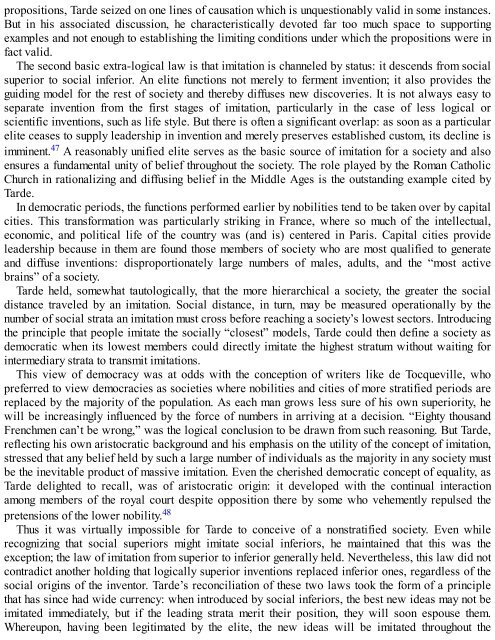3658925934
You also want an ePaper? Increase the reach of your titles
YUMPU automatically turns print PDFs into web optimized ePapers that Google loves.
propositions, Tarde seized on one lines of causation which is unquestionably valid in some instances.<br />
But in his associated discussion, he characteristically devoted far too much space to supporting<br />
examples and not enough to establishing the limiting conditions under which the propositions were in<br />
fact valid.<br />
The second basic extra-logical law is that imitation is channeled by status: it descends from social<br />
superior to social inferior. An elite functions not merely to ferment invention; it also provides the<br />
guiding model for the rest of society and thereby diffuses new discoveries. It is not always easy to<br />
separate invention from the first stages of imitation, particularly in the case of less logical or<br />
scientific inventions, such as life style. But there is often a significant overlap: as soon as a particular<br />
elite ceases to supply leadership in invention and merely preserves established custom, its decline is<br />
imminent. 47 A reasonably unified elite serves as the basic source of imitation for a society and also<br />
ensures a fundamental unity of belief throughout the society. The role played by the Roman Catholic<br />
Church in rationalizing and diffusing belief in the Middle Ages is the outstanding example cited by<br />
Tarde.<br />
In democratic periods, the functions performed earlier by nobilities tend to be taken over by capital<br />
cities. This transformation was particularly striking in France, where so much of the intellectual,<br />
economic, and political life of the country was (and is) centered in Paris. Capital cities provide<br />
leadership because in them are found those members of society who are most qualified to generate<br />
and diffuse inventions: disproportionately large numbers of males, adults, and the “most active<br />
brains” of a society.<br />
Tarde held, somewhat tautologically, that the more hierarchical a society, the greater the social<br />
distance traveled by an imitation. Social distance, in turn, may be measured operationally by the<br />
number of social strata an imitation must cross before reaching a society’s lowest sectors. Introducing<br />
the principle that people imitate the socially “closest” models, Tarde could then define a society as<br />
democratic when its lowest members could directly imitate the highest stratum without waiting for<br />
intermediary strata to transmit imitations.<br />
This view of democracy was at odds with the conception of writers like de Tocqueville, who<br />
preferred to view democracies as societies where nobilities and cities of more stratified periods are<br />
replaced by the majority of the population. As each man grows less sure of his own superiority, he<br />
will be increasingly influenced by the force of numbers in arriving at a decision. “Eighty thousand<br />
Frenchmen can’t be wrong,” was the logical conclusion to be drawn from such reasoning. But Tarde,<br />
reflecting his own aristocratic background and his emphasis on the utility of the concept of imitation,<br />
stressed that any belief held by such a large number of individuals as the majority in any society must<br />
be the inevitable product of massive imitation. Even the cherished democratic concept of equality, as<br />
Tarde delighted to recall, was of aristocratic origin: it developed with the continual interaction<br />
among members of the royal court despite opposition there by some who vehemently repulsed the<br />
pretensions of the lower nobility. 48<br />
Thus it was virtually impossible for Tarde to conceive of a nonstratified society. Even while<br />
recognizing that social superiors might imitate social inferiors, he maintained that this was the<br />
exception; the law of imitation from superior to inferior generally held. Nevertheless, this law did not<br />
contradict another holding that logically superior inventions replaced inferior ones, regardless of the<br />
social origins of the inventor. Tarde’s reconciliation of these two laws took the form of a principle<br />
that has since had wide currency: when introduced by social inferiors, the best new ideas may not be<br />
imitated immediately, but if the leading strata merit their position, they will soon espouse them.<br />
Whereupon, having been legitimated by the elite, the new ideas will be imitated throughout the









![Genki - An Integrated Course in Elementary Japanese II [Second Edition] (2011), WITH PDF BOOKMARKS!](https://img.yumpu.com/58322134/1/180x260/genki-an-integrated-course-in-elementary-japanese-ii-second-edition-2011-with-pdf-bookmarks.jpg?quality=85)
![Genki - An Integrated Course in Elementary Japanese I [Second Edition] (2011), WITH PDF BOOKMARKS!](https://img.yumpu.com/58322120/1/182x260/genki-an-integrated-course-in-elementary-japanese-i-second-edition-2011-with-pdf-bookmarks.jpg?quality=85)





